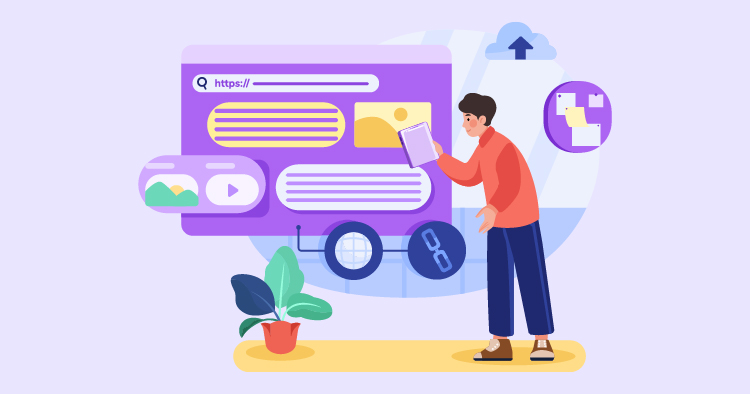On-page SEO is essential for anyone who wants to make their website more visible and rank higher in search engine results. It’s all about making improvements to your website itself. This means writing good content, using meta tags smartly, and organizing your site so search engines can understand it easily. When you get good at on-page SEO, your site becomes more noticeable, you get more visitors without paying for ads, and everyone who comes to your site has a better time. We will look at the critical parts of on-page SEO and give you some practical advice on how to use it to improve your SEO strategy.
Understanding On-Page SEO
On-page SEO is optimizing individual web pages to rank higher in search engines and earn more relevant traffic. It involves refining a page’s content and the HTML source code. This differs from off-page SEO, which focuses on links and other external signals.
On-page SEO is a detailed approach to making your website more attractive to search engines and users. It involves optimizing the content and structure of your website, including strategically placing keywords, writing compelling meta descriptions, and crafting effective title tags. By controlling these elements, on-page SEO becomes an essential component of your overall SEO strategy.
It’s not just about tweaking your site once and forgetting it. On-page SEO is an ongoing process. The goal is to continuously improve various elements to ensure your content is accessible and engaging. This helps your website stand out in search engine results and can lead to better user engagement.
Why is on-page SEO important?
Communicate Better with Search Engines
On-page SEO is crucial because it helps search engines understand your website and its content. When you optimize your pages, you’re making it easier for search engines to index your site and recognize its value. By carefully selecting keywords and organizing your content effectively, you can communicate more clearly with search engines. This increases the likelihood that your site will be considered relevant and be positioned higher in search results.
Effective on-page SEO aligns your website’s content with search engine algorithms. By doing so, you can significantly improve your site’s visibility. This can attract more visitors and contribute to your website’s growth and success online.
It’s Also About the User
On-page SEO is more than satisfying search engines—creating a better visitor experience. When your website has a clear content structure and is easy to navigate on any device, users can find what they’re looking for without hassle. Plus, visitors are likelier to stick around when you provide valuable and relevant content. This can lead to a higher chance of them taking the action you want, such as purchasing or signing up for a newsletter.
Moreover, on-page SEO is pivotal in establishing trust with your audience. When people encounter thorough and trustworthy content on your site, it enhances their perception of your brand. This can increase confidence in your products or services and improve your overall reputation.
Struggling with Digital marketing? Book Your Free Strategy Session!
- 30-Minutes Session
- Expert Insights
- Data-Driven approach
- Optimized Strategies for Your Goals
Building with On-Page SEO Before Moving to Off-Page SEO
Getting on-page SEO right is essential before you jump into off-page SEO. Think of on-page SEO as the foundation of a house—it needs to be solid before you can start working on the exterior. If your on-page SEO isn’t up to par, all the time and energy you put into off-page strategies might be less effective. Search engines need to view your site as credible and noteworthy, and on-page SEO is what signals that to them.
The good news is that on-page SEO is under your control. You can directly influence how well your website is structured and the quality of the content you publish. This ensures that you’re setting your website up for success, which is a crucial step before employing off-page SEO tactics.
By prioritizing on-page SEO, you’re thoroughly preparing your website to benefit from off-page SEO efforts. This combination can significantly increase your site’s visibility and rankings, leading to a more effective overall SEO strategy.
Tips for Boosting Your Rankings with On-Page SEO
Create Great Content
Writing excellent content is a cornerstone of a solid online presence. Good content engages visitors, answers their questions, and encourages them to return. It’s essential to keep your content up-to-date, informative, and aligned with what your audience is searching for.
Regularly refreshing your content can keep your website lively and current, increasing user engagement and loyalty; moreover, when visitors stay longer because they enjoy your content, search engines notice. This can improve your site’s visibility and lead to a higher ranking in search results.
Fine-tune Page Titles and Meta Descriptions
Page titles and meta descriptions are your first opportunity to make an impression on search engines and potential visitors. They should be engaging and include relevant keywords to capture attention.
Writing compelling titles and descriptions can improve your website’s click-through rate, encouraging users to explore more of your content. This can lead to more interactions and, potentially, more conversions. Plus, well-crafted titles and descriptions act as a preview of your content, sparking interest and curiosity right from the search results page.
Enhance Page Content
Improving your page content is more than just adding a few keywords here and there. It’s about crafting your words in a way that appeals to search engines and makes them a pleasure to read. When you’re thoughtful about incorporating keywords, your content stands out and may climb higher in search engine rankings.
Try using variations of your primary keyword. This avoids monotony and addresses different questions your audience may have. It’s like hitting two birds with one stone: Your writing will flow better and become more relevant to various search queries.
Don’t forget to weave in internal and external links. These links are like secret passages that can lead readers to a treasure trove of information. They enrich your content by providing more angles on a subject, encouraging readers to dive deeper and engage more with your content.
Headings and How They Shape Content
Think of headings, subheadings, and bullet points as your content’s backbone. They do more than break up the text. They act as signposts that help readers navigate your information and quickly find what they need.
But the headings’ role extends beyond reader convenience. They’re also crucial for SEO. Search engines use them to understand your content’s structure and key points, and sprinkling keywords into your headings can boost your SEO efforts.
Moreover, well-organized content is a treat for readers. It’s like having a conversation where the ideas flow logically. This clarity can keep readers engaged and increase their likelihood of staying on your page longer.
Brighten Up Content with Images and Multimedia
Using images and other forms of multimedia can bring your content to life. When you have long articles or posts, adding pictures can help divide the text and make engaging readers more accessible. They not only provide a visual break but also help illustrate and emphasize your points.
When you upload images, consider what you name them. Choosing the correct file name and adding ‘alt’ text (alternative text) can be a small but effective way to improve your content’s SEO. Search engines use this information to understand what the image is about, which can help your content appear in search results.
But why stop at pictures? Including videos, infographics, and other types of multimedia can captivate your audience in different ways. Some prefer watching a quick video to reading a text, while others enjoy a well-designed infographic summarizing complex information. By diversifying your content this way, you’re making it more engaging and enjoyable for a wider audience.
The Power of a Good URL
Choosing the correct URL is crucial for SEO success. When creating a URL, you should aim for something short and easy to understand and include keywords relevant to your content. This helps search engines, and people know what to expect from your page before visiting it.
A well-crafted URL looks clean and clear, which can appeal to potential readers. If they can guess the topic of your content just by looking at the URL, they’re more likely to feel confident about clicking through to your site. Plus, descriptive URLs can stand out in search results and attract more clicks.
By considering your multimedia elements and URLs, you can make your content more appealing and accessible to your audience and search engines, which is a win-win for your online presence.
Struggling with Digital marketing? Book Your Free Strategy Session!
- 30-Minutes Session
- Expert Insights
- Data-Driven approach
- Optimized Strategies for Your Goals
Connect Your Content with Internal Links
Internal links are a powerful tool for connecting your website’s content. Think of your website as a city and your internal links as the roads connecting different locations. Just as roads help people navigate a city, internal links help users navigate your website. They allow users to move from one page to another quickly, find relevant information, and discover more about the topics they’re interested in.
However, internal links aren’t just suitable for users; they’re also great for search engine optimization (SEO). These links help distribute page authority across your site, which can improve your rankings in search results. Plus, they make it easier for search engines to crawl and understand your site’s structure. By linking related pages, you’re essentially giving search engines a map of your content, showing how pages relate to one another and what your site is about.
Spreading the Word with External Links
External links are just as important as internal ones. They are like bridges connecting your website to the rest of the Internet. When you include links to other high-quality websites, you provide your readers with additional resources to enhance their understanding or provide different viewpoints.
However, external links offer more than just extra information. They also help create a network of related sites and establish your place. By linking to authoritative and respected websites, you can align your site with the experts in your field, which can help build your credibility and authority.
Search engines also pay attention to these links. They use them to gauge the quality and relevance of your content. Linking to reputable sources can signal to search engines that your content is trustworthy and valuable, potentially leading to higher rankings. This helps your website gain more visibility and ensures readers get a comprehensive and well-rounded experience.
Fast Page Loading: Keeping Users Happy
Nobody enjoys waiting for a web page to load. When pages take too long, it’s frustrating and often leads to people leaving the site. This reduces the number of visitors who stay on your site and can also hurt your search engine optimization (SEO). Search engines prioritize faster-loading sites because they provide a better user experience. By improving your page speed, you keep your visitors’ content and enhance your brand’s image. Satisfied visitors are more likely to return, engage with your content, and even recommend your site to others.
Be Friends with Mobile Users
With the rise of smartphones, many people are using their mobile devices to access the internet. Ensuring that your website is mobile-friendly is essential. It allows everyone to access your site quickly, regardless of where or what device they use. Search engines also favor mobile-friendly websites and rank them higher in search results. This can lead to more visibility for your site. A mobile-friendly website can attract a wider audience, offering convenience and adaptability, leading to more people enjoying your content. This adaptability can result in higher engagement, more conversions, and overall growth for your online presence.
Final Thoughts
With more businesses going online, on-page SEO is more important than ever. It’s not just about making search engines happy; it’s also about giving people a great experience when they visit your site. When you work on creating great content, fine-tuning your images and meta tags, and making sure your site works well on phones, you’re building a solid base for your site’s future. Remember, on-page SEO isn’t something you do just once; it’s an ongoing job that needs you to pay close attention and keep things fresh and up-to-date.



